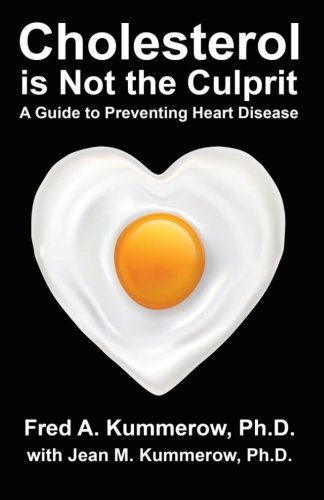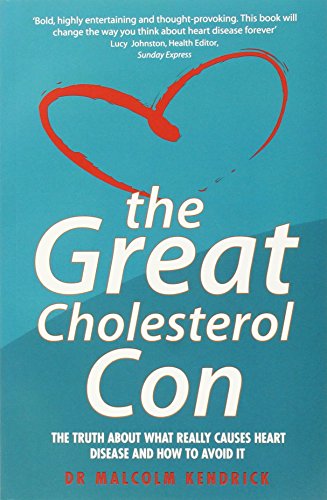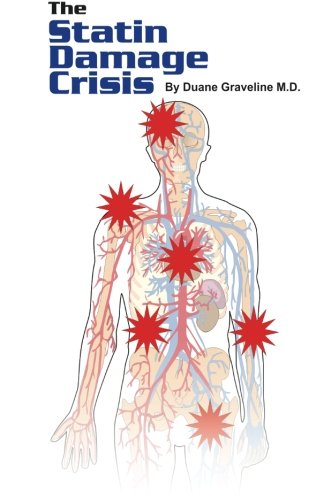A revealing report, largely unreported by the news media, ignored by health regulatory agencies and physician groups, demands that guidelines for use of statin cholesterol-lowering drugs be reevaluated in light of newly analyzed science.
Researchers in Japan analyzed studies published after 2004-2005 when new regulations for how to conduct human clinical trials went into effect. [British Journal Obstetrics Gynecology 2007] The new guidelines require all sponsors of drug trials to publish negative or inconclusive studies, not just positive studies; and they require full reporting of side effects.
As it turns out, researchers in Japan, only analyzing human clinical trials launched after 2004-2005 found that statin drugs do indeed lower circulating levels of “bad” LDL (low-density lipoproteins) but exhibit no benefit in
 Cholesterol is Not the...
Best Price: $6.26
Buy New $12.79
(as of 09:40 UTC - Details)
prevention of coronary heart disease!
Cholesterol is Not the...
Best Price: $6.26
Buy New $12.79
(as of 09:40 UTC - Details)
prevention of coronary heart disease!
While cardiologists maintain statin drugs are effective in the prevention of coronary heart disease, those claims are based upon research prior to the 2004-2005 regulations. Industry (drug company)-supported studies were not included in the analysis by the researchers in Japan. Their report calls for urgent reevaluation of statin drugs based on the following findings:
Statin drugs reduce cell energy to heart muscle cells, as measured by ATP (adenotriphosphate) in the power plants (mitochondria) of living cells. Statins reduce cellular energy by depletion of an internal antioxidant coenzyme Q10. Statin drugs are described a “mitochondrial toxins.” Cellular energy depletion leads to heart muscle damage.
Statin drugs deplete the trace mineral selenium that is required to produce an internal antioxidant – glutathione (glu-ta-thy-on) peroxidase, which is inhibited by statin drugs. A decline in glutathione peroxidase levels is associated with coronary heart disease.
Statin drugs inhibit the conversion of vitamin K1 from vegetable sources to vitamin K2 that in turn acts to inhibit calcification of coronary arteries that supply the heart with oxygen and nutrients. The combination of vitamin K-depleting blood thinners (warfarin) with statin drugs, which is a common combination, hastens the development of artery-stiffening calcifications.
 The Great Cholesterol ...
Best Price: $3.82
Buy New $2.99
(as of 07:30 UTC - Details)
The Great Cholesterol ...
Best Price: $3.82
Buy New $2.99
(as of 07:30 UTC - Details)
Researchers in Japan also note that statin drugs impair the human immune system.
Researchers in Japan conducted a large-scale study of statin drugs among subjects with total cholesterol that exceeded 220 milligrams/deciliter of blood. After 6 years of statin drug use an increase in mortality for cardiovascular disease, cancer, and all causes was recorded.
Another study that was reviewed, conducted among veterans over a 5-year span, concluded that subjects prescribed statin drug therapy were 1.6 times more likely to suffer death from all causes.
The researchers in Japan report a considerable disparity between the 30% relative reduction in coronary heart disease events (heart attacks) in trials conducted before 2004-2005 and those conducted afterward.
This reporter revealed that the 30% alleged reduction in heart attacks (non-mortal heart attacks, not mortal ones) with statin drugs is a statistical ruse. To read more on the subject refer to my 2008 report published at LewRockwell.com.
 The Statin Damage Crisis
Best Price: $5.64
Buy New $6.90
(as of 09:20 UTC - Details)
The Statin Damage Crisis
Best Price: $5.64
Buy New $6.90
(as of 09:20 UTC - Details)
Statin drug users may experience heart failure on average 6 years following statin drug use. Cessation of statin drug use by heart failure patients and supplementation with 240 mg of coenzyme Q10 showed significant improvement in heart muscle function. It is not likely that physicians recognize heart failure as a drug side effect since it commonly occurs 6 years following the first statin drug use.
The conclusion by these researchers is that: “the applicability of statin drugs should be severely restricted” and that clinicians not rely on drug information provided by drug company-sponsored trials.
These researchers go on to say: “Physicians who are involved in prescribing cholesterol-lowering medications cannot ignore the moral responsibility of ‘informed consent.’ Patients must be informed of all statin adverse effects, including the ability to CAUSE coronary heart disease and heart failure, an onset of diabetes, cancer, birth defects and nerve and kidney disorders. Most of these adverse effects of statins become apparent after six or more years after statin therapy. The chronic administration could ultimately lead to statin adverse effects as pharmaceutical and biochemical research has now demonstrated.” [Expert Reviews Clinical Pharmacology March 2015; Expert Reviews Clinical Pharmacology 2016]





